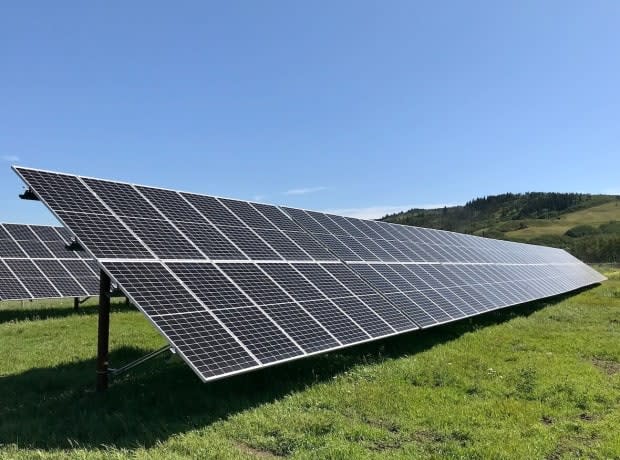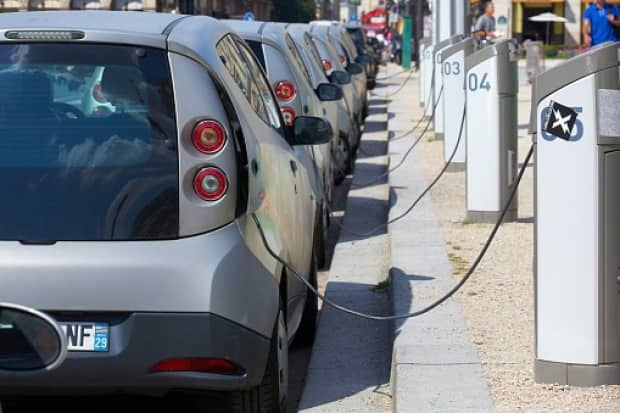Budget goes big on green spending as environmentalists criticize tax credits for carbon capture

As the world confronts a warming climate, the federal Liberals are committing billions more dollars to reduce greenhouse gas emissions across the economy and help drive a "green recovery" from the pandemic-induced economic slowdown.
Finance Minister Chrystia Freeland tabled a budget today that sets aside $17 billion in new direct spending and tax relief measures that the government hopes will decarbonize heavy industry, build a cleaner economy and create jobs.
"We are at a pivotal moment in the green transformation," Freeland said in a speech to the House of Commons.
"We can lead, or we can be left behind. Our government knows that the only choice for Canada is to be in the vanguard."
Freeland said the budget measures will help the government meet its greenhouse gas reductions targets under the Paris climate agreement, achieve net-zero emissions by 2050 and preserve 25 per cent of land and marine conservation targets by 2025.
But environmentalists said they fall short of the transformative change needed for Canada to become a climate leader.
WATCH: Freeland tells MPs the budget will invest in green energy:
In what appeared to be the announcement of a new federal emissions reduction target, Freeland said the new measures will help reduce greenhouse gas emissions in Canada by 36 per cent compared to 2005 levels by 2030 — well beyond the government's current target of 30 per cent.
Environment Minister Jonathan Wilkinson's office later clarified that the 36 per cent number represents the floor for a new target — not the actual target. Prime Minister Justin Trudeau is expected to unveil a more ambitious national emissions reduction target at a climate summit hosted by U.S. President Joe Biden this week.
Targeting industry, retrofitting homes
Much of the proposed spending focuses on giving private sector companies incentives to develop and adopt clean technology.
Five billion dollars over seven years will go to the Net Zero Accelerator, a fund that helps large-emitting companies reduce their greenhouse gas emissions. That's on top of $3 billion the government committed in December.
Sarah Petrevan, policy director at Clean Energy Canada, said the total $8 billion will help heavy industries such as steel and cement decarbonize and grow their competitiveness.
"Government's role is to kind of set the stage for then private markets to develop and shift in the direction, and this is kind of what [Liberals] are doing," she said of the budget.
WATCH | Budget includes support for green initiatives and small business:
"That's the kind of thing that you have to do support an economic transition. It can't all be government."
To help foster a domestic clean technology manufacturing sector in Canada, the government said it will offer companies that manufacture zero emission devices, like solar panels and electric vehicles, a 50 per cent cut to their corporate or small business taxes for the next 10 years.
For homeowners and landlords, the budget includes a $4.4 billion plan to retrofit residential buildings to make them more energy efficient. The money will flow through the Canada Mortgage and Housing Corporation (CMHC) and will take the form of interest-free loans of up to $40,000 for projects like replacing oil furnaces with higher-efficiency furnaces, installing better wall insulation, adding solar panels or replacing drafty windows and doors.
The government estimates more than 200,000 households could take advantage of that program.

Tom-Pierre Frappé-Sénéclauze, the buildings and urban solutions director at the Pembina Institute, an environmental think-tank, said the retrofit funding could create up to 10,000 well-paying jobs over the next five years. But he said Canadians will need to spend more on retrofitting their homes for Canada to meet its climate goals.
"While significant, this investment, unfortunately, is unlikely to get us to our destination," he said.
Another initiative targeting heavy emitters is a tax credit for companies that invest in technology that captures carbon dioxide emitted by fuel combustion or other industrial processes and stores it in the ground instead of releasing it into the atmosphere. The budget said the government will undertake a 90-day consultation process to determine the rate of the incentive for capital investments in carbon capture, utilization and storage (CCUS).
"Canada is a leader in CCUS, with domestic projects that currently capture four megatonnes of carbon every year, but we have the technical and geological capacity to capture and store much more," the budget document said.
Alberta Premier Jason Kenney, who is a strong proponent of carbon capture technology as a way of reducing emissions from the province's energy sector, recently asked the federal government for $30 billion in funding to explore CCUS technologies. In addition to the tax credit, today's budget pledges only $319 million over seven years for the federal natural resources department for carbon capture research and development.
Environmentalists criticize support for carbon capture
Environmental groups criticized the funding for carbon capture technology and the oil and gas sector, arguing that it would delay the transition away from fossil fuels.
"That money would have been better allocated to measures that reduce fossil fuel consumption," the David Suzuki Foundation said in a statement.
Julia Levin, the climate and energy program manager at Environmental Defence, said the funding risks locking Canada into "decades of increased carbon pollution."
"If implemented without robust conditions, this money may go to support unproven technologies that will delay a transition away from fossil fuels," she said.
"We need to be starting the wind-down of the oil and gas sector in order to ensure that we have a liveable planet — these supports do the exact opposite."

Other climate initiatives in the budget include the establishment of a federal "green bond" designed to attract investment to projects that can help Canada meet its climate goals, like green infrastructure and nature conservation.
Getting more electric vehicles on the road is a priority for the Liberals and the budget promises $56 million over five years to work with countries like the U.S. on bringing in standards for zero-emission vehicle charging and refuelling stations.
Monday's budget also promises $2.3 billion in funding to federal departments such as Parks Canada and Fisheries and Oceans to conserve up to one million square kilometres of land and inland waters to meet the country's 2025 conservation targets.
Teika Newton, policy director for Climate Action Network Canada, praised the investments in clean transportation, energy-efficient homes and green bonds. But Newton said more needs to be done.
"Some investments made by budget 2021 are extremely helpful," said Newton. "Yet the big take away is this: we are in a time of changing norms, and budget 2021 does not present a vision for climate-safe transformational change"

 Yahoo Finance
Yahoo Finance 